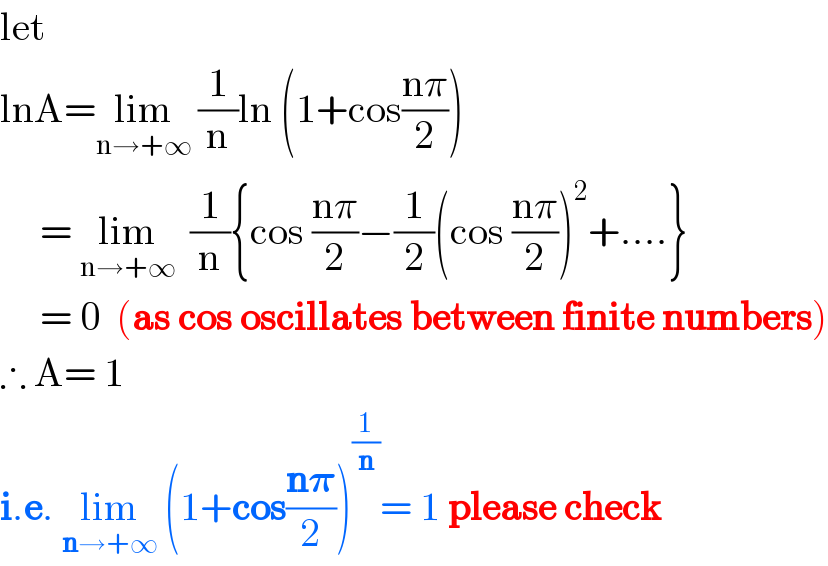
Question Number 102347 by mohammad17 last updated on 08/Jul/20

Commented by bobhans last updated on 08/Jul/20

$$\mathrm{ln}\left(\mathrm{y}\right)\:=\:\underset{{n}\rightarrow\infty} {\mathrm{lim}}\:\frac{\mathrm{1}}{{n}}\left(\mathrm{1}+\mathrm{cos}\:\left(\frac{{n}\pi}{\mathrm{2}}\right)\right) \\ $$$$\mathrm{ln}\left(\mathrm{y}\right)\:=\:\underset{{n}\rightarrow\infty} {\mathrm{lim}}\frac{\mathrm{1}+\mathrm{cos}\:\left(\frac{{n}\pi}{\mathrm{2}}\right)}{{n}}\:=\:\mathrm{0} \\ $$$${y}\:=\:{e}^{\mathrm{0}} \:=\:\mathrm{1} \\ $$
Commented by mohammad17 last updated on 08/Jul/20

$${thank}\:{you}\:{sir} \\ $$
Answered by PRITHWISH SEN 2 last updated on 08/Jul/20

$$\mathrm{let} \\ $$$$\mathrm{lnA}=\underset{\mathrm{n}\rightarrow+\infty} {\mathrm{lim}}\:\frac{\mathrm{1}}{\mathrm{n}}\mathrm{ln}\:\left(\mathrm{1}+\mathrm{cos}\frac{\mathrm{n}\pi}{\mathrm{2}}\right) \\ $$$$\:\:\:\:\:=\:\underset{\mathrm{n}\rightarrow+\infty} {\mathrm{lim}}\:\:\frac{\mathrm{1}}{\mathrm{n}}\left\{\mathrm{cos}\:\frac{\mathrm{n}\pi}{\mathrm{2}}−\frac{\mathrm{1}}{\mathrm{2}}\left(\mathrm{cos}\:\frac{\mathrm{n}\pi}{\mathrm{2}}\right)^{\mathrm{2}} +....\right\} \\ $$$$\:\:\:\:\:=\:\mathrm{0}\:\:\left(\boldsymbol{\mathrm{as}}\:\boldsymbol{\mathrm{cos}}\:\boldsymbol{\mathrm{oscillates}}\:\boldsymbol{\mathrm{between}}\:\boldsymbol{\mathrm{finite}}\:\boldsymbol{\mathrm{numbers}}\right) \\ $$$$\therefore\:\mathrm{A}=\:\mathrm{1}\: \\ $$$$\boldsymbol{\mathrm{i}}.\boldsymbol{\mathrm{e}}.\:\underset{\boldsymbol{\mathrm{n}}\rightarrow+\infty} {\mathrm{lim}}\:\left(\mathrm{1}+\boldsymbol{\mathrm{cos}}\frac{\boldsymbol{\mathrm{n}\pi}}{\mathrm{2}}\right)^{\frac{\mathrm{1}}{\boldsymbol{\mathrm{n}}}} =\:\mathrm{1}\:\boldsymbol{\mathrm{please}}\:\boldsymbol{\mathrm{check}} \\ $$
Commented by Dwaipayan Shikari last updated on 08/Jul/20

$${Yes}\:{it}\:{s}\:{right}\:{sir}\: \\ $$
Commented by PRITHWISH SEN 2 last updated on 08/Jul/20

$$\mathrm{thank}\:\mathrm{you} \\ $$
Answered by mathmax by abdo last updated on 08/Jul/20

$$\mathrm{A}_{\mathrm{n}} =\left(\mathrm{1}+\mathrm{cos}\left(\frac{\mathrm{n}\pi}{\mathrm{2}}\right)\right)^{\frac{\mathrm{1}}{\mathrm{n}}} \:\Rightarrow\:\mathrm{A}_{\mathrm{n}} =\mathrm{e}^{\frac{\mathrm{ln}\left(\mathrm{1}+\mathrm{cos}\left(\frac{\mathrm{n}\pi}{\mathrm{2}}\right)\right)}{\mathrm{n}}} \:\mathrm{but}\:\mathrm{lim}_{\mathrm{n}\rightarrow+\infty} \:\frac{\mathrm{ln}\left(\mathrm{1}+\mathrm{cos}\left(\frac{\mathrm{n}\pi}{\mathrm{2}}\right)\right)}{\mathrm{n}}=\mathrm{0}\:\Rightarrow \\ $$$$\mathrm{lim}_{\mathrm{n}\rightarrow+\infty} \:\mathrm{A}_{\mathrm{n}} =\mathrm{1} \\ $$
